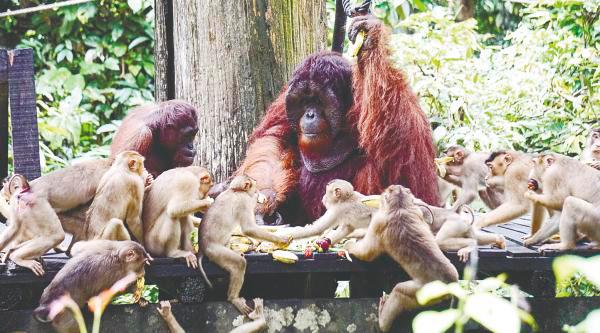FOR centuries, countries have used animals as diplomatic gifts. In the 19th century, Egypt sent three giraffes to European nations as goodwill gestures. Thailand has long engaged in “elephant diplomacy”, going back at least to when its king proposed giving an elephant to US President Abraham Lincoln, who wisely declined the offer.
China’s modern panda programme, designed to foster good international relations and trade, has been a complete failure for the pandas, who spend their lives in cages, and the females are compelled to endure repeated invasive artificial inseminations and forced pregnancies only to watch their babies die or be taken away from them.
The recent news that Malaysia may also take up this cruel practice and gift orangutans to countries that buy its palm oil raises serious questions once again about using animals as tools in international relations.
These animals are native to Malaysia and Indonesia and are critically endangered due to habitat loss. These intelligent sentient beings face a bleak future as their natural habitat continues to shrink.
Instead of using animals as diplomatic pawns, Malaysia should prioritise collaborative efforts to combat international wildlife trafficking and devote resources to habitat preservation.
There are no benefits for animals treated as political trinkets. Whether they are born in captivity or taken from their natural habitat, they are removed from the surroundings they have grown familiar with and torn away from their friends and family.
They are then forced to adjust to new routines and an unfamiliar environment. The climate of the country they are sent to may be entirely inappropriate, and their care and treatment may be difficult to monitor.
These gestures never end well for the animals, and two recent cases drew international criticism: in 2013, the government of Mali gave France a camel, which was later slaughtered for a feast, and in 2023, Thailand demanded the return of an elephant which had been given to Sri Lanka due to alleged mistreatment.
It is heartbreaking to hear that Malaysia is considering gifting orangutans, who would be condemned to a lifetime of confinement without natural dietary and social enrichment.
It is devastating to know that more of these gentle animals may be denied everything that is meaningful and important to them, from foraging for food to roaming free.
We now know far more about the complex needs of animals than we did centuries – or even just decades – ago.
Orangutans are intelligent, social individuals who form close bonds with their families and friends.
They communicate using complex gestures, empathise with others, laugh when they play and exhibit signs of self-awareness.
Instead of using animals for diplomatic purposes, Malaysia and the global community should collaborate on wildlife conservation and habitat preservation.
Allowing animals to thrive in their natural homes is fundamental to their well-being as opposed to separating them from their families and confining them in foreign countries, where they may endure loneliness and suffer.
Orangutans, like all sentient species, deserve to be treated with respect and dignity, not as bargaining chips in a game of trade.
Countries can establish ties and foster international relations without harming animals and putting their lives at risk.
Jason Baker is the senior vice president of People for the Ethical Treatment of Animals.









